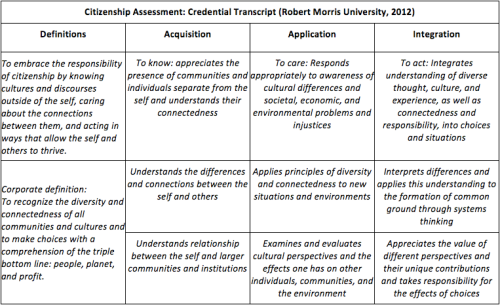By Jenny Jocks Stelzer, Sustainability Council Chair and English Faculty, College of Liberal Arts, Robert Morris University
(This article appears in the March, 2012 issue of The ACUPCC Implementer)
In the 2011-2012 academic year, faculty of the College of Liberal Arts (CLA) on Robert Morris University’s Assessment Committee determined that the university should assess our students for awareness of and engagement with sustainability in the same way that the university assesses all students for proficiencies in oral and written communication, quantitative analysis, leadership, and collaboration. Until that point, the university had assessed for cultural awareness, which incorporated diversity as a value prioritized by the university. The CLA decided that sustainability, as defined by environmental, economic, and social justice for this and future generations, should join diversity as an important part of Robert Morris University’s role in preparing students to not only be career holders in an economy, but to be participants in a democracy as sustainable citizens.
In making these changes, Robert Morris University displays its commitment to the responsibility of higher education to not only prepare students for the workforce, but prepare them as local and global citizens. Because of its commitment to the ACUPCC, RMU has enthusiastically driven curricular change that prepares students to understand the interconnectedness between the individual, society, and the world, and, thus, to become a class of citizens capable of driving sustainability transformation in the future.
The following is the “Credential Transcript” for assessment of Citizenship. Students earn levels in the transcript through certain courses that incorporate awareness of and engagement with the different aspects of sustainability and diversity as noted in the credential. The CLA assesses students for their credentials through the completion of projects, the achievement of particular grades in noted courses, or extra-curricular and curricular field experiences.
Citizenship Assessment Form Questions
The following is a list of the questions posed to students upon completion of the afore-mentioned assessment achievements.
1. Events like this are an important part of my college experience.
2. I was bored at this event.
3. I would participate in something like this again with family or friends.
4. Events like this have nothing to do with why I am in college.
5. I will think about the event after I leave today.
6. This event helped me see that my actions affect others.
7. It is important to feel responsibility toward my community.
8. It is important to feel responsibility toward other communities and the world.
9. This event made me feel connected to others.
10. It is important that I make decisions that do not damage other individuals, communities, or the environment.
The following is the College of Liberal Arts Citizenship Statement, which is articulated on all syllabi in the College of Liberal Arts.
The College of Liberal Arts avows citizenship as the means to developing students into foundations for their families and communities. Citizenship includes experiential and reflective learning that leads students to a comprehension of the connectedness between individuals, cultures, and the environment. Through the curricular and extra-curricular integration of Cultural Connections and Sustainability, Robert Morris University challenges students to know what is happening in diverse communities, to care about those communities, and to actas citizens of the world.
For higher education to continue to build its leadership role in sustainability, it is of the utmost importance for all of higher education – most importantly those signatories of the ACUPCC – to include meaningful curricular change which encourages thought, engagement, and action that prepares students for the responsibilities of leadership in a sustainable world. Robert Morris University has embraced that responsibility and has implemented the curricular change to ensure that its students are those leaders.


Add new comment